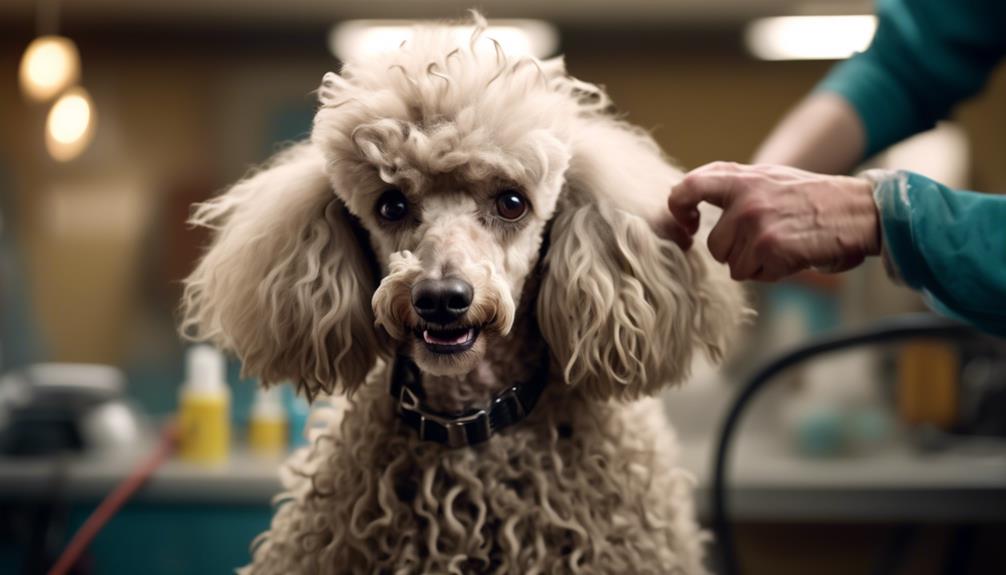Poodles, with their elegant appearance and graceful demeanor, have long been regarded as one of the most sophisticated dog breeds. However, beneath their refined exterior lies a multitude of reasons why poodles might just be the worst choice for a pet. From the endless hours spent on grooming to their incessant barking that can drive even the most patient person to the brink of insanity, poodles have a knack for testing their owners' patience. But that's not all; their snobbish attitudes and stubborn nature can make training a daunting task, while their predisposition to health issues can quickly drain your bank account. In this discussion, we will uncover the various drawbacks of owning a poodle, perhaps leaving you with second thoughts about this seemingly glamorous breed.
Key Takeaways
- Poodles require regular and meticulous grooming to prevent tangling and matting, which can cause discomfort and skin irritation.
- Poodles are prone to excessive barking due to their alertness, protective nature, and lack of mental and physical stimulation.
- Poodles have a tendency to exhibit snobbish attitudes towards humans and other animals, displaying superiority and aggression towards those they consider beneath them.
- Poodles are susceptible to various genetic health issues, including hip dysplasia, progressive retinal atrophy (PRA), certain cancers, skin allergies, and ear infections, leading to ongoing care and significant financial burden for owners.
Grooming Nightmares

Grooming nightmares associated with Poodles have been well-documented and can be attributed to their unique coat texture and high maintenance grooming requirements. Poodles have a dense, curly, and continuously growing coat that requires regular grooming to prevent matting and tangling. However, despite their owners' best intentions, haircuts can sometimes go wrong, leading to disastrous results and giving rise to these grooming nightmares.
One of the primary reasons for grooming nightmares in Poodles is the complexity of their coat texture. The curly nature of their fur makes it prone to tangling and matting, especially if not properly maintained. When the fur becomes tangled, it can cause discomfort, pain, and even skin irritation for the Poodle. Additionally, tangled fur can also harbor dirt, debris, and parasites, further exacerbating the problem.
Haircuts gone wrong can compound the grooming nightmares for Poodles. Achieving the desired look for a Poodle requires skill and expertise, as their coat requires specific trimming techniques. If the grooming process is not executed correctly, it can result in uneven haircuts, patches of baldness, or even accidental cuts and injuries. These mishaps can not only cause physical discomfort to the Poodle but may also lead to emotional distress and a negative perception of grooming.
Endless Barking
The behavioral characteristic of endless barking is another area of concern that can be observed in Poodles, adding to the complexities of their overall temperament. Poodles, known for their intelligence and energy, are prone to excessive barking, which can be a source of frustration for owners and a cause for noise complaints from neighbors. Understanding the reasons behind this behavior and exploring effective training solutions can help address this issue.
Here are five key factors to consider when dealing with endless barking in Poodles:
- Breed Tendency: Poodles were originally bred as water retrievers and guard dogs, which explains their inclination to bark. Their alertness and protective nature contribute to their tendency to vocalize excessively.
- Lack of Stimulation: Poodles are highly intelligent and require mental and physical stimulation. When their needs are not met, they may resort to barking as a means of releasing pent-up energy and relieving boredom.
- Separation Anxiety: Poodles are known for their strong attachment to their owners. When left alone for extended periods, they may become anxious and resort to barking as a means of seeking attention or alleviating their distress.
- Territorial Behavior: Poodles have a strong sense of territory and may bark excessively to ward off perceived intruders or protect their living space.
- Insufficient Training: Inconsistent or inadequate training can contribute to the development of excessive barking habits in Poodles. Proper training, including positive reinforcement techniques, can be effective in modifying this behavior.
Addressing endless barking in Poodles requires a comprehensive approach that includes mental and physical stimulation, separation anxiety management, and consistent training. Consulting a professional dog trainer or behaviorist can provide guidance tailored to individual Poodles and help mitigate noise complaints while ensuring a harmonious living environment for both owners and neighbors.
Snobbish Attitudes

One notable aspect of Poodles' temperament is their tendency to exhibit snobbish attitudes, which can be observed in their interactions with both humans and other animals. Poodles are known for their arrogant behavior and elitist demeanor, often displaying a sense of superiority over others. This snobbishness is apparent in their body language, vocalizations, and overall demeanor.
When interacting with humans, Poodles may display a range of snobbish behaviors. They may refuse to acknowledge or interact with individuals they deem beneath them, displaying a dismissive attitude. Poodles may also exhibit a haughty posture, with their heads held high and their tails curled tightly over their backs. These behaviors convey a sense of superiority and an unwillingness to engage with those they consider unworthy.
In their interactions with other animals, Poodles can be equally snobbish. They may ignore or show disdain towards dogs of other breeds, considering themselves to be of a higher class. This behavior can manifest in snarling, growling, or even outright aggression towards other animals they perceive as inferior.
To further illustrate the snobbish attitudes of Poodles, the following table showcases some common behaviors associated with their elitist demeanor:
| Snobbish Attitudes of Poodles |
|---|
| Ignoring individuals they deem beneath them |
| Haughty posture and body language |
| Dismissing or refusing to engage with others |
| Displaying aggression towards animals they consider inferior |
| Snarling or growling at dogs of other breeds |
Stubborn to the Core
Poodles' snobbish attitudes are not the only challenging aspect of their temperament, as their stubbornness is deeply ingrained in their core behavioral traits. This stubbornness can present significant difficulties for dog owners, requiring patience, persistence, and careful training techniques. Here are five key factors that contribute to the poodle's stubborn nature:
- High intelligence: Poodles are highly intelligent dogs, ranking second only to the Border Collie in terms of intelligence. While this intelligence makes them quick learners, it also means they can be independent thinkers, prone to testing boundaries and questioning commands.
- Strong-willed nature: Poodles have a strong sense of self and a desire for autonomy. They are known for their determination and willpower, which can lead to resistance when it comes to following instructions or obeying commands.
- Sensitivity to inconsistency: Poodles are sensitive to changes in their environment and routine. Any inconsistencies in training methods or expectations can result in confusion and reluctance to comply with commands.
- Selective listening: Poodles have a knack for selectively listening to their owners. They may choose to follow commands when it suits them or when they perceive a reward is imminent, but otherwise, they may choose to ignore instructions.
- Boredom and lack of mental stimulation: Poodles are highly active and require mental stimulation to prevent boredom. When their mental needs are not met, they may become more stubborn and resistant to training.
To address their stubbornness, poodles require training methods that emphasize consistency, positive reinforcement, and mental stimulation. Resistance training techniques, such as using long lines or harnesses, can help redirect their stubborn behavior. Behavior modification strategies, including reward-based training and interactive toys, can also be effective in keeping poodles engaged and motivated to follow commands. By understanding and working with their stubborn nature, owners can foster a more cooperative and harmonious relationship with their poodles.
Health Issues and Expenses

Health issues and expenses associated with poodles can pose significant challenges for dog owners. Poodles have a reputation for being high maintenance, and this extends to their health. They are prone to a variety of genetic predispositions that can lead to costly medical treatments and ongoing care.
One of the most common health issues in poodles is hip dysplasia, a genetic condition where the hip joint doesn't develop properly. This can cause pain, lameness, and difficulty walking. Treatment options may include medication, physical therapy, or even surgery. These treatments can be expensive and require ongoing management.
Another genetic predisposition seen in poodles is progressive retinal atrophy (PRA), a degenerative eye disease that leads to blindness. Regular ophthalmologic exams and potential treatments such as surgery or medication may be necessary to slow down the progression of the disease. These costs can quickly add up and become a financial burden for dog owners.
Poodles also have a higher risk of developing certain types of cancers, such as melanoma and hemangiosarcoma. These conditions often require specialized treatments like chemotherapy, radiation therapy, or surgery. The costs associated with cancer treatments can be substantial and may not always guarantee a positive outcome.
Additionally, poodles are prone to skin allergies and ear infections, which can require frequent visits to the veterinarian and ongoing medication. These recurring expenses can accumulate over time.
Frequently Asked Questions
How Often Should I Groom My Poodle to Avoid Grooming Nightmares?
To avoid grooming nightmares with your poodle, it is important to establish a regular grooming routine. Grooming tips for poodles include brushing their curly coat daily to prevent matting and tangling. Additionally, regular bathing, nail trimming, and ear cleaning are essential for maintaining their hygiene. The frequency of grooming sessions can vary depending on the length of your poodle's coat, but generally, a professional grooming every 4-6 weeks is recommended. By following these guidelines, you can keep your poodle looking and feeling their best while avoiding any grooming-related issues.
Are Poodles the Only Breed Known for Their Endless Barking?
When comparing poodles to other breeds, it is important to consider their tendency for barking. While poodles are often associated with excessive barking, it is not accurate to claim that they are the only breed known for this behavior. Many other breeds also have the potential to bark incessantly if not properly trained or stimulated. Moreover, it is worth mentioning that poodles are highly intelligent and adaptable, which makes them well-suited for various roles, including being therapy dogs.
Do Poodles Have a Reputation for Snobbish Attitudes Towards Other Dogs?
Poodles, the misunderstood breed: Are poodles actually snobbish towards other dogs or is it just a stereotype? The reputation of poodles for having snobbish attitudes towards other dogs is a topic of discussion among dog enthusiasts. While some people believe that poodles can exhibit snobbish behavior, it is important to approach this question objectively and consider the individual temperament and socialization of each dog. Stereotypes should not be generalized to the entire breed, as poodles, like any other breed, can vary in their personalities and interactions with other dogs.
Can Poodles Be Trained Out of Their Stubborn Behavior?
Poodles, like any other dog breed, can exhibit stubborn behavior that may require training. Various poodle training techniques exist to address this issue. It is important to approach poodle training with patience, consistency, and positive reinforcement. By using reward-based methods and understanding the underlying reasons for their stubbornness, owners can effectively modify their poodle's behavior. It is worth noting that individual dogs may vary in their response to training, so it is crucial to tailor the approach to the specific poodle's needs.
What Are Some Common Health Issues That Poodles May Experience and How Expensive Are the Related Expenses?
Poodles, like any other breed, can experience common health issues that may require veterinary care. These can include hip dysplasia, progressive retinal atrophy, and allergies. The costs of treating these health issues can vary depending on the severity of the condition and the location. Additionally, poodles require regular grooming due to their curly coat, which can be time-consuming and expensive. It is also important to address training needs to overcome stubborn behavior, which can require patience and consistency.
Conclusion
In conclusion, the evidence suggests that poodles may have some undesirable traits such as grooming difficulties, excessive barking, snobbish attitudes, and stubbornness. Additionally, they may be prone to certain health issues, resulting in potential expenses. However, it is important to note that these characteristics may vary among individual poodles and are not representative of the entire breed. Further research is needed to fully understand the temperament and characteristics of poodles.

